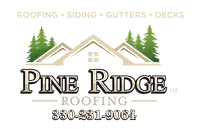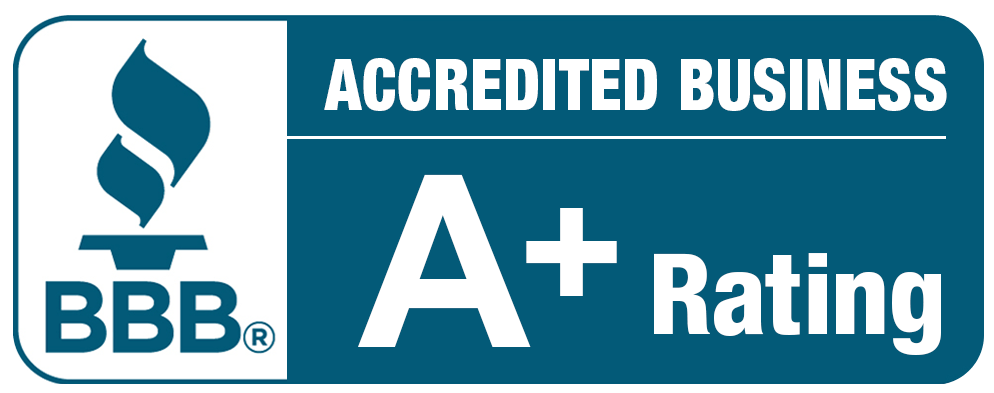Atwater Center Roof Damage by Weather Conditions and Insurance Claims - A Comprehensive Guide
Your residence is not just a home; it’s a sanctuary. The role of your roof in upholding its safety and security is pivotal. However, when the inevitable roof damage by weather conditions strikes, understanding the various types of damage caused by the elements, mastering the insurance claim process, and implementing effective roof maintenance practices become crucial for safeguarding your investment.
This all-encompassing guide is your companion in navigating through the essentials, empowering you to protect your home and confidently handle “roof damage by weather conditions and insurance claims.”
In Atwater Center, roof damage resulting from severe weather conditions such as storms, high winds, tornadoes, and hail is a frequent occurrence, and Pine Ridge Roofing is poised to provide support in addressing these issues.
Key Takeaways
Table of Contents
Atwater Center Roof Damage - Types of Weather-Related Roof Damage
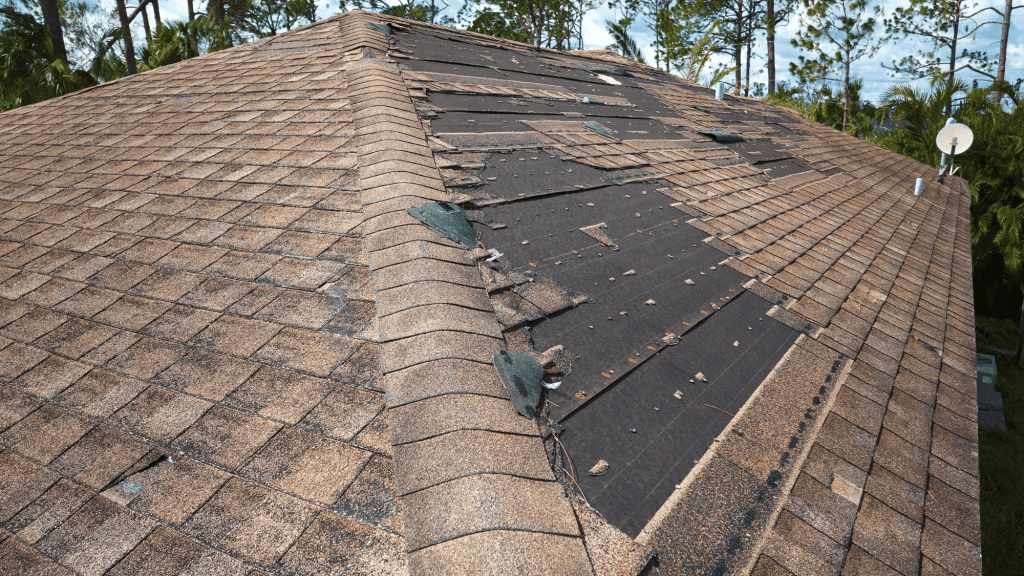
In Atwater Center, roof damage by weather conditions is really common. Weather can be unpredictable, and it can wreak havoc on your roof. Wind, hail, and rain or snow are the most common culprits of weather-related roof damage, often leading to insurance claims and costly repairs or replacements.
Protecting your home requires recognizing the signs of storm damage and comprehending how these forces impact your roofing materials.
Is roof damage covered by insurance? For home insurance to provide coverage for your roof damage expenses, it is essential to establish that the damage was a direct result of an extreme weather event.
Wind Damage
In Atwater Center, roof damaged by high winds can be a silent enemy to your roof, causing missing shingles, lifted flashing, or cracked tiles and they can also blow off your entire roof. These types of damage might seem minor at first, but they can lead to leaks and structural damage over time, making it necessary to go through the roof insurance claim process. Repairing an older roof can be challenging, as older shingles might lack flexibility and may crack during the repair process, leading to further issues. When dealing with a roof damage insurance claim, it’s important to engage a qualified roofing specialist to properly make a roof inspection and address the damage.
Gaining insight into the specific wind insurance coverage within your homeowner’s insurance policy will enable you to be better prepared for adverse weather conditions, particularly during storm events.
Wind damage can result from various weather events, such as severe storms or hurricanes. Monitoring your roof’s condition after these events and acting swiftly if visible signs of wind damage are noticed is of great importance. If you discover a heavy tree branch on your roof, it is advised to have it removed by a professional in a safe manner to prevent further damage and potential roof damage claims.
Hail Damage
When a hailstorm hits, it can leave a path of destruction in its wake, causing dents, punctures, and granule loss on shingles. This type of damage might not always be visible to the untrained eye, but it can significantly impact your roof’s lifespan and performance. Hail can cause bruising or cracking of the shingle mat, allowing water to enter your home gradually and potentially leading to a roof claim.
Roof inspection for hail damage can be challenging, especially after a storm. Insurance adjusters and roofing professionals often consider metal components surrounding the roof, such as:
- Roof vents
- Pipe boots
- Gutters
- Roof flashing
Dents in these metal pieces may suggest hail damage. However, it is not recommended to go on the roof right after a storm, particularly if the roof has a steep slope.
In case of significant hail damage to your roof, immediate action is necessary, such as attaching tarps to the roof, to prevent further damage from rainwater.
Rain and Snow Damage
Rain and snow may seem harmless, but they can wreak havoc on your roof if not properly managed. Here are some potential issues caused by rain and snow:
- Leaks and water damage
- Structural issues
- Roof collapse due to the weight of accumulated snow
- Ice dams, which can damage your roof and gutters
It’s important to take steps to protect your roof from these potential problems.
Undertaking preventive measures such as routine inspections, ensuring sufficient ventilation and waterproofing, and promptly addressing any damage is vital to prevent rain and snow damage. By staying proactive in maintaining your roof and understanding your homeowner’s insurance coverage options, such as Actual Cash Value (ACV) and Replacement Cost Value (RCV) policies, you can minimize the risk of costly repairs or replacements due to weather-related damage.
Atwater Center Roof Damage - Insurance Coverage for Weather-Related Issues
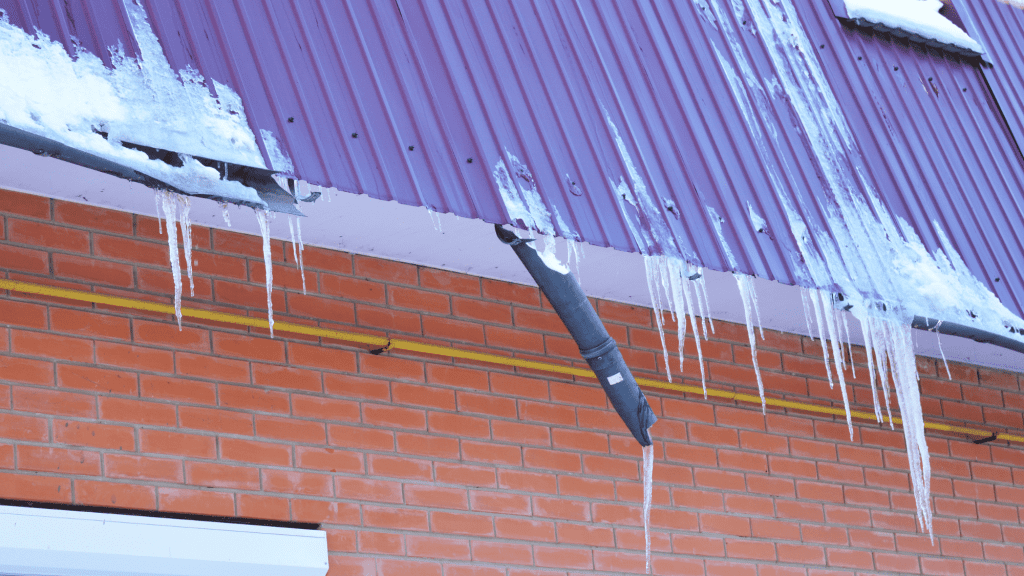
The importance of the insurance company becomes apparent when unforeseen occurs roof damage in Atwater Center, Ohio. Nevertheless, grappling with the intricacies of insurance coverage can prove to be a formidable challenge. Gaining insight into policy differentiations, such as Actual Cash Value (ACV) and Replacement Cost Value (RCV), and staying informed about prevalent exclusions can significantly influence the handling and ultimate settlement of your claim.
Policy Types: ACV vs RCV
When it comes to roof coverage, an Actual Cash Value (ACV) policy is designed to facilitate the replacement process by reimbursing you for the depreciated value of your roof, minus the deductible. Essentially, this means you’ll receive compensation based on the current value of your roof at the time of damage. However, it’s important to note that this might not cover the entire cost of repairs or replacement.
On the flip side, a Replacement Cost Value (RCV) policy offers more extensive coverage. It covers the entire cost of roof replacement, providing funds for a new roof based on current market prices and materials. Under an RCV policy, you’ll first receive a check for the actual cost value of your roof. After completing the roof replacement, a second check for the remaining amount will be issued, contingent upon meeting all specified requirements.
The choice of a suitable policy for your needs can greatly impact the payout you receive in the event of a roof damage claim, making it an important decision. It is essential to:
- Review your insurance policy
- Understand the differences between ACV and RCV
- Consult with your home insurance company to ensure you have the appropriate coverage for your specific situation.
Common Exclusions
While safeguarding your home from weather-related roof damage in Atwater Center, OH, through homeowners insurance is crucial, understanding common exclusions is equally important to ensure a smooth claims process. Common exclusions include:
- improper installation, where deviating from manufacturer instructions or local building codes can lead to accelerated wear and tear, potentially voiding your roof’s warranty.
- overlooking routine maintenance tasks, like cleaning gutters and debris removal, might result in damages not covered by your policy.
- Some policies may also exclude specific weather events, such as hurricanes or earthquakes.
Thoroughly reviewing your insurance policy is essential to grasp these exclusions and guarantee appropriate coverage for your roof. Inadequate maintenance occurs when regular inspections and maintenance, aligned with manufacturer guidelines and local codes, are neglected, possibly causing premature deterioration and invalidating warranties.
Understanding these exclusions and ensuring proper roof installation, maintenance, and protection against excluded weather events are vital steps to prevent potential claim denials. Staying informed and taking a proactive approach to roof care can minimize the risk of costly repairs or replacements stemming from weather-related damage.
Atwater Center Roof Damage - Filing an Insurance Claim

Filing an insurance claim for roof damage in Atwater Center, OH can be a complex and time-consuming process. Knowing how to document the damage, working effectively with insurance adjusters, and choosing the right roofing contractor is crucial in ensuring a smooth and successful claims process.
This section will walk you through the steps of filing an insurance claim for roof damage, coupled with tips to navigate the process smoothly.
Documenting the Damage
Thorough documentation is a key aspect when initiating an insurance claim for roofing damage. Here’s a guide to follow:
- Photograph the affected areas extensively, focusing on any missing shingles, raised flashing, or damaged tiles.
- Create a comprehensive list of the damage, accompanied by detailed notes, including dates, times, and relevant weather conditions contributing to the damage.
- If preventive measures have been implemented, such as using tarps on the roof, document these measures through photographs.
Following the documentation process, seek an estimate from a certified roofing contractor to determine the cost of repairs or replacement. This estimate not only provides clarity on the damage extent but also serves as crucial documentation when presenting your claim to the insurance company. Maintaining a thorough and precise record of the roofing damage significantly enhances the chances of a successful claim.
Working with Adjusters
In Atwater Center, roof damage insurance adjusters are pivotal to the claims process, assessing the damage and determining the claim payout value. A successful claim outcome hinges on effective collaboration with adjusters, emphasizing the need for accurate information, meticulous record-keeping of all interactions and documents, and maintaining transparency throughout.
In the event of a denied claim, exploring resolution options becomes crucial:
- One approach is requesting a different adjuster from your insurance company to provide a second opinion.
- Another option is consulting a structural engineer for a thorough inspection and evidence of the damage.
- As a last resort, pursuing legal avenues is an available course of action.
By comprehending the adjusters’ role and preparing for effective collaboration, you enhance the chances of a successful claim. This ensures you receive the coverage needed to repair or replace your roof damaged in Atwater Center.
Choosing a Reputable Roofing Contractor
Choosing a reputable roofing contractor assures quality work and facilitates a smooth claims process. When researching roofing contractors for insurance claims, consider their experience with insurance claims, turnaround times, and their ability to work with adjusters. A qualified roofing contractor can accurately document the damage according to insurance companies’ requirements and provide an expert assessment.
Choosing a local and reliable roofing contractor, such as Pine Ridge Roofing, can provide peace of mind knowing that your roof repair or replacement is in good hands. Their team of certified roofers and insurance specialists is available to assist with storm repair, restoration, and insurance claims in Atwater Center, Ohio, and the surrounding areas. By selecting an experienced roofing contractor, you can ensure the safety and integrity of your home.
Atwater Center Roof Damage - Preventative Measures and Maintenance
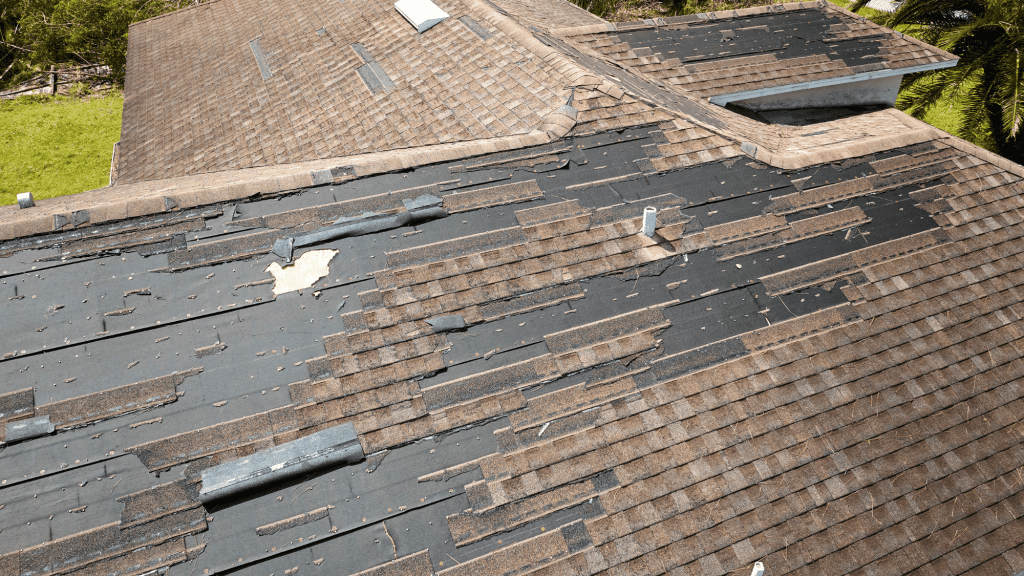
While insurance serves as a financial safeguard against roof damage caused by adverse weather conditions, adopting preventative measures is equally crucial. Routine inspections, proper ventilation, and robust waterproofing are key elements in preserving the integrity of your roof. By prioritizing these preventive actions, you can significantly reduce the risk of weather-related damage, mitigating the need for expensive repairs or replacements in the long run.
Routine Inspections
Regular roof inspections serve as an effective method to spot and tackle potential issues before they escalate into significant problems. Inspections should evaluate the roof for signs of:
- Deterioration
- Missing or damaged shingles
- Debris in the gutters
- Roof ponding
To ensure the longevity of your roof, it’s advisable to schedule routine inspections, ideally twice a year or more frequently in regions with harsh weather.
By taking a proactive approach to maintenance, you can catch minor issues before they become major problems, saving you money on potentially expensive repairs. Pine Ridge Roofing offers free roof inspections, providing a reliable and expert assessment of your roof’s condition. Don’t wait—call us now to schedule your inspection and protect your investment.
Proper Ventilation and Waterproofing
Proper ventilation and waterproofing are essential elements in safeguarding your roof against moisture buildup, ice dams, and other weather-related damage. This involves:
- Maintaining good indoor air quality
- Implementing effective home ventilation practices
- Utilizing exhaust fans and air purifiers
- Installing a robust ventilation system
- Correctly attaching roof ventilation products.
Inadequate attention to ventilation and waterproofing can lead to issues such as moisture accumulation and ice dams, potentially requiring expensive repairs and replacements. By prioritizing these measures, you can mitigate the risk of damage, ensuring your roof’s longevity and the optimal performance of your roofing materials.
Pine Ridge Roofing: Your Partner in Roof Repair and Insurance Claims
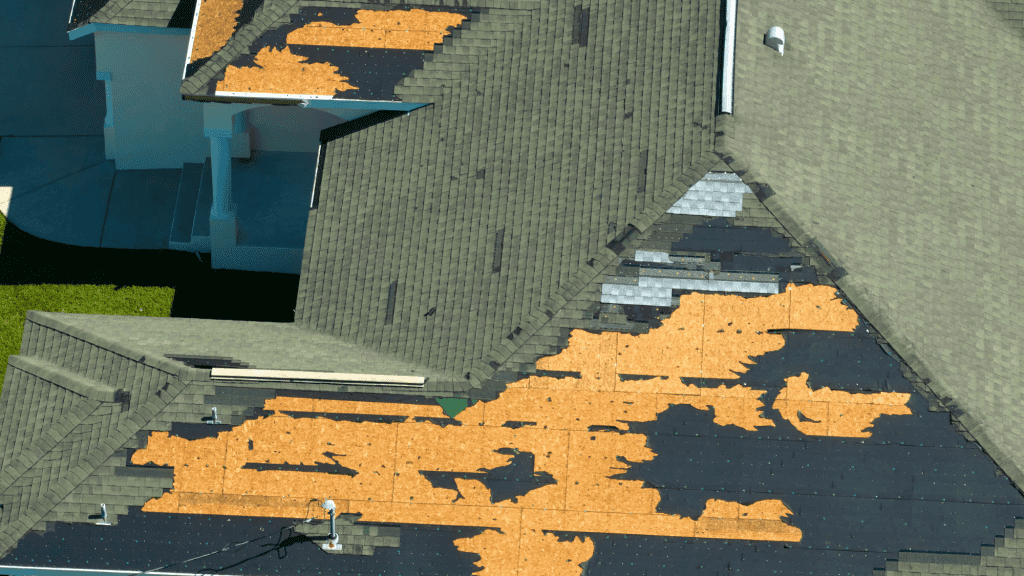
Pine Ridge Roofing, serving Atwater Center, OH, and surrounding areas, specializes in:
- Storm damage repairs
- Insurance claims
- Emergency inspection
- Tarping services
- Assistance with insurance claims for weather-related roof damage
- Roof replacements
- Siding repair and replacement
- Gutter repair and replacement
- Leaf Guard Installation
- Deck building
Boasting a cumulative experience of 25 years, our dedicated team of certified roofers and insurance specialists is focused on delivering exceptional roof repairs. We prioritize the protection and restoration of your home in the aftermath of any weather-related damage event.
Emergency Inspection and Tarping Services
Suspecting roof damage? Schedule a free emergency inspection with Pine Ridge Roofing to evaluate the extent of the damage and determine the best course of action for repairs or replacement. Our team of experts performs a thorough assessment of your roof, identifying any missing shingles, lifted flashing, or cracked tiles that may need immediate attention.
In addition to emergency inspections, Pine Ridge Roofing offers the following services:
- Tarping services provide temporary protection and prevent any further damage to your roof.
- Act quickly by securing your roof with tarps to minimize the risk of additional damage.
- We ensure your home stays safe and secure throughout the insurance claim process.
Insurance Claim Assistance
Navigating the insurance claim process can be overwhelming, but Pine Ridge Roofing is here to help. They offer the following services:
- Assisting with insurance claims
- Representing homeowners
- Negotiating with insurance companies
- Providing quality roof replacement services
Pine Ridge Roofing excels in handling insurance claims to secure the optimal result for your claim, enabling you to concentrate on your family’s safety and well-being. Their insurance claim support encompasses:
- scheduling emergency inspections
- tarping damaged areas
- representing homeowners during insurance adjuster meetings
- negotiating with insurance companies
- utilizing premium products like Owens Corning shingles and synthetic felt for roof replacements.
Pine Ridge Roofing ensures that your roof repair or replacement is executed with professionalism and efficiency, offering you the assurance that your home is well-protected.
Summary
The challenge of weather-related roof damage in Atwater Center, Ohio is one that every homeowner may face. It’s crucial to comprehend the diverse types of damage, adeptly manage the insurance claim process, and take proactive steps for roof maintenance. Armed with the insights from this comprehensive guide and the support of Pine Ridge Roofing, a reputable contractor, you can face weather-related roof damage with confidence, assuring the safety and security of your home and family.
Frequently Asked Questions
Does Home Insurance Cover Roof Storm Damage?
The coverage of roof storm damage in your home insurance policy hinges on the specific terms included in the plan. Most insurance plans typically cover damages resulting from hail, strong winds, destruction caused by falling objects, and internal damage due to roof storm damage. For instance, if a storm results in the destruction of your roof and subsequent rainwater damage to the ceiling, your insurance policy will generally provide coverage for repairing both the roof and ceiling.
Are blown-off shingles covered by insurance?
Insurance companies typically understand the importance of a roof and will cover the cost of roof replacement when shingles are blown off due to unpreventable circumstances.
What is considered wind damage to shingles?
Wind damage to shingles is typically characterized by tearing, creasing, or detachment from the roof. This usually occurs in three-tab shingles due to repeated lifting or flapping, and unsealed shingles are exempt unless there is physical mat damage.
My roof doesn’t leak. Does this mean my roof is okay?
Even if your roof appears leak-free, it doesn’t guarantee its flawless condition. Roof damage often lurks beneath the surface, remaining invisible until it becomes a significant issue. At Pine Ridge Roofing, our experienced professionals use advanced tools and techniques to detect hidden moisture and identify potential damage not easily visible. Don’t wait for leaks to reveal the problem; schedule a complimentary inspection with us today!
What is the most common roof damage?
Roof damage in Atwater Center, OH frequently manifests as leaks, typically attributed to issues like damaged shingles, improper flashing near chimneys or gutters, and surrounding vents or pipes.
